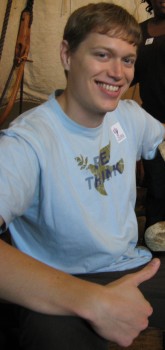Watson Fellow Tim Richards '10 Explores Sustainable Ways of Life

Details
By this time next year, Tim Richards '10 may be an expert in organic gardening, natural building, and reforestation.
Richards expects to acquire this knowledge as he spends next year exploring sustainable living across five continents, courtesy of his 2010 Watson Fellowship project,“Holistic Environmentalism: Community Approaches to Sustainability.” Richards is one of 41 students from select liberal arts colleges across the country who were chosen as 2010-11 Watson Fellows; they will receive funding to focus on independent projects outside of the United States.
Richards will travel to Argentina, Australia, India, New Zealand, Nicaragua, Scotland, and Thailand, and will live in three types of communities that have emerged as international movements aimed at achieving sustainable lifestyles. They are: permaculture communities, human settlements that mirror the relationships found in natural ecologies; ecovillages, international communities of people who strive to live environmentally low-impact lives; and Transition Towns, pre-existing communities that address environmental issues by reducing their carbon emissions and use of fossil fuel.
“I want to witness ways in which human life can become more holistically sustainable,” says Richards.
The philosophy major has long been environmentally conscious and active. In 2007, he founded an organization called Citizens for a Green Mt. Airy in his hometown of Mt. Airy, Md. with funding from Haverford's Center for Peace and Global Citizenship. He was the originator and author of the fall 2007“Sustainable Haverford” plenary resolution at Haverford, which ultimately led to Haverford buying 100 percent wind power on campus. He even attended the December 2009 COP15 international climate conference in Copenhagen. But his activism was reinvented two years ago when he spent 10 days at Las Cañadas, an ecovillage in Mexico's Veracruz province. Here, residents practice self-sustainability through their own energy and food production and waste management; they also supply their own water, using pumps to capture rain water from roofs or move water from nearby creeks.
During his time there, Richards helped re-forest trees, haul compost, shell beans, and harvest vegetables. He also ate community home-grown and home-cooked organic meals, took showers heated by wood fires, and participated in a sweat lodge. “It was a transformative experience,” he says.“It suggested to me that we cannot achieve sustainability simply as individuals outside of a community context.”
Richards, who spent last fall at the Danish Institute for Study Abroad, will begin his journey by attending a two-week Permaculture Design Course at the Permaculture Research Institute in Australia; the course was recommended by Haverford alumnus and former Watson Fellow Ethan Roland '04, who is now a professional permaculture designer. From there, Richards will traverse the world to explore his chosen communities. He also plans to visit“conventional” neighborhoods in the surrounding regions to get local impressions of his temporary homes; what he wants to find out, he says, is“are these communities viewed as ideal enclaves isolated from the problems of society at large?”
Richards will blog about his experiences at sustainablephilosopher.wordpress.com.
-Brenna McBride



